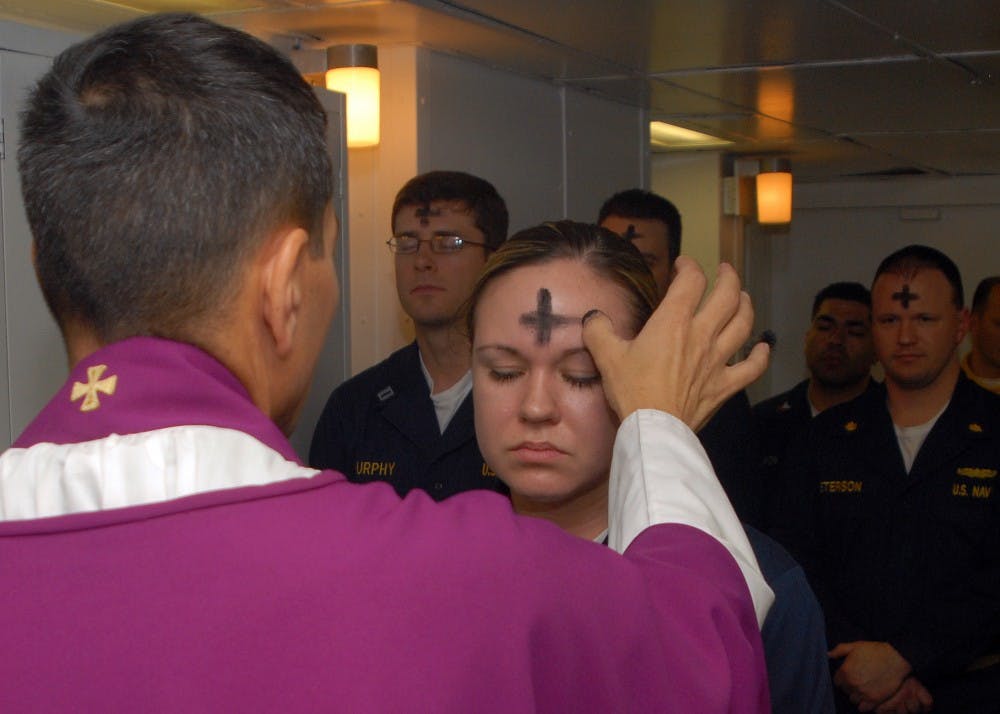
This Wednesday, as couples celebrate their love and single folks unify in shared independence, another humble holiday transpires below the surface — the beginning of Lent.
As a formerly Catholic child, I can recall the traditions all too well: feasting on Fat Tuesday, attending church (often for the first time in months) on Wednesday to receive a smudge of ash on my forehead and then that afternoon, beginning a long 40 days of sacrifice.
For Christians, Lent marks the 40 days that Jesus spent journeying through the desert before eventually (as the Bible tells it) being crucified on Good Friday and resurrected on Easter Sunday.
In honor of Jesus’ struggle, many devout Christians spend Lent repenting for their sins and turning away from material pleasures. Hypothetically, Lent is a time of peaceful religious reflection. But for little, confused Lily, Lent was always a long 40 days of discomfort.
Growing up, my family never felt truly religious. My dad comes from a long line of conservative Roman Catholics, and when my mom and dad got married, his parents made them promise to raise their future children in the Catholic faith.
My mom was religiously open minded, so she agreed, but these days, she looks back on this decision with regret. “If you ever get married, Lily,” she tells me, “don’t let your in-laws treat you like a doormat.”
But despite going through all the Catholic motions — baptisms, Sunday school, First Communion, Confirmation and even a four-year stint as an altar server — I never felt completely at home in the church. I never felt confident in my faith. Part of this, I think, stemmed from a lack of candid conversations.
When I was little, my parents never talked about religion. They were both busy: My dad worked long hours as a corporate lawyer, and my mom was juggling a part-time job, child-care and the early stages of my sister’s mental illness.
My silly questions about God were not exactly a top priority. And thus, I kept them to myself. I unleashed them only in private, in the safety of my quiet, moonlit bedroom. There, I was free to doubt.
Nearly every night, I scribbled out my reflections in a floral-print notebook. Along with the classic little-girl preoccupations (my crushes, my dreams, my obsession with Gilmore Girls), 10-year-old Lily also scribbled questions: “What does it feel like to die? How can consciousness go on forever? Am I a good person? Will I go to Hell if I’ve lied or cheated?”
I was a prematurely anxious girl, brimming with existential dread and curiosity. There was so much I yearned to understand. And when my parents, my siblings and the intimidating nuns at church refused to answer my questions, I made up my own solutions.
For a while, I believed that every one of my actions was being tallied and judged. Have you seen The Good Place? Basically, 10-year-old me believed this was reality: Everything you do has a net value, positive or negative, and gets ranked into your total value as a person.
Every time I lied to my parents about brushing my teeth, I felt a palpable knotting in my stomach. A hissing voice condemned me: “You’ve been bad.” And then, according to the strange rules of my universe, after every mistake I made, the world would give me my comeuppance.
This also worked in reverse: If a boy at school called me ugly, or I fell down the stairs, or my sister threw a violent tantrum — I thought to myself, “This must be some sort of punishment.” I must be dong something wrong. I would wrack my brain constantly, brainstorming mistakes, tallying up the ways in which I wasn’t measuring up.
As you might imagine, this was exhausting. My childhood was full of positive memories, for sure, but if there’s one thing I look back on with regret, it is my relationship to religion. I write this with some hesitation, because I know there are countless people who feel nurtured and supported by their spiritual communities. To them, I have nothing but respect. Honestly, sometimes, I envy them. For me, though, Christianity was never a source of solace; it was a source of anxiety.
Around this time of year, all these memories rush back to the surface. Lent was always the worst for me (a classic scenario: 10-year-old Lily pledges to give up sweets. On day 30, she eats a single Oreo. She subsequently plunges into deep, catastrophic self-hatred for her sinful mistake).
Luckily, in the decade that has passed since my Catholic upbringing, I have grown tremendously. When I was 17, I started asking my parents about religion, and to my great surprise, they answered me. We started addressing my biggest fears in a way that finally felt genuine.
I confided in friends; I read books of philosophy and religious theory; I listened to TED Talks about self-love; I wrote stories; I went to therapy. Somewhere along the way, I learned a lesson I still carry with me (and even still struggle with today): Forgive yourself.
It sounds so simple, but to me, this was groundbreaking. I spent so many years feeling like I was born sinful, and thus I needed to work tremendously to mold myself into someone who would be worthy of goodness. In essence, I spent years hating myself.
While I believe that — yes, correcting past mistakes is necessary, and ethical development is admirable — it is just as necessary to accept yourself, exactly as you are.





